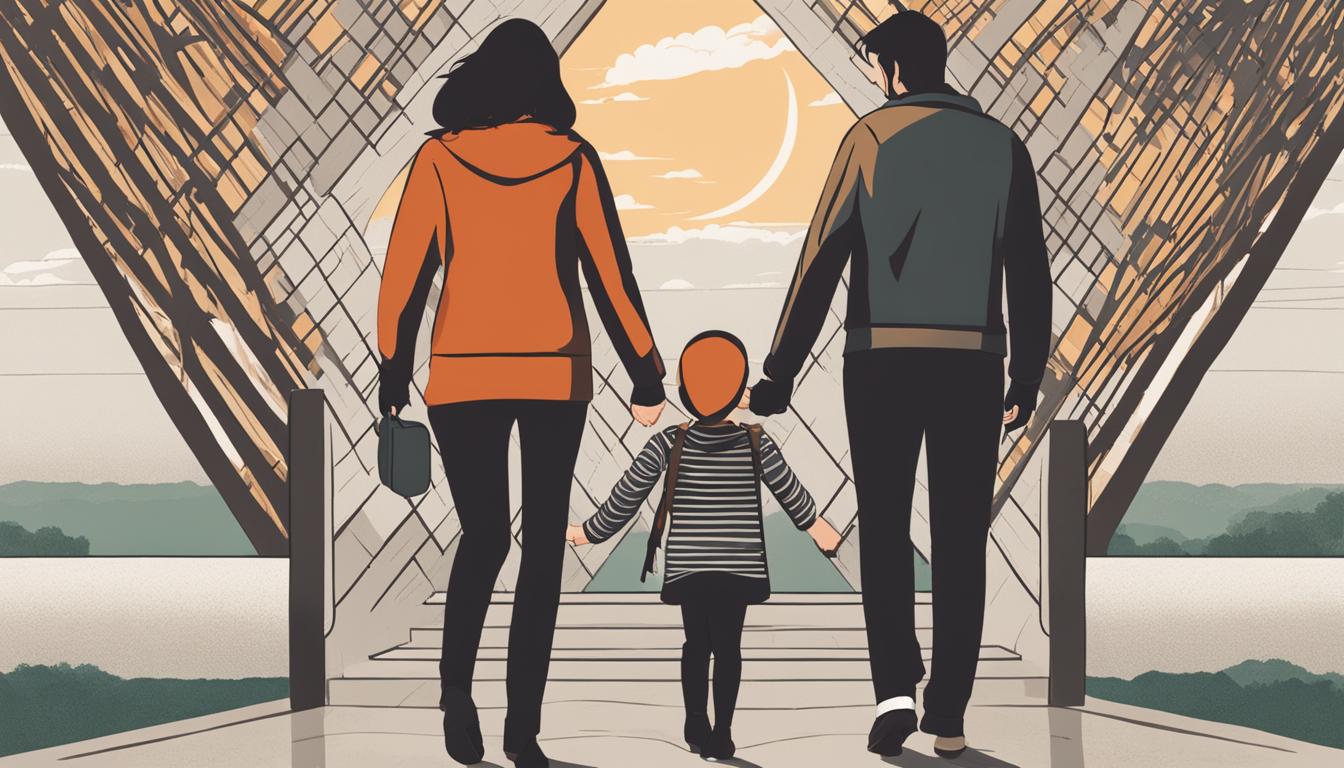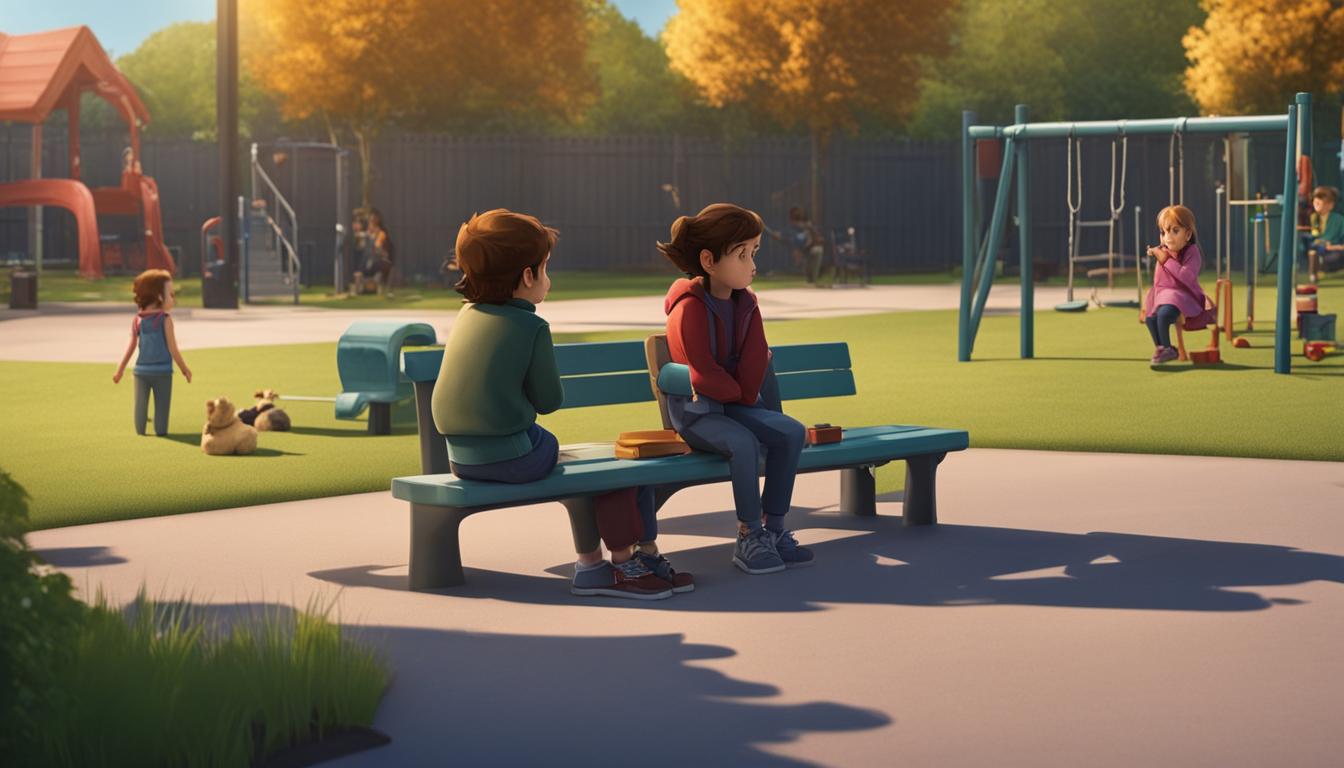Childhood experiences play a significant role in shaping our adult relationships. Both positive and adverse childhood experiences have a lasting impact on how we form and maintain healthy connections with others. Understanding the effects of childhood on adult relationships is crucial for promoting emotional well-being and fostering fulfilling partnerships.
Key Takeaways:
- Childhood experiences, both positive and adverse, shape individuals’ ability to form and maintain healthy relationships in adulthood.
- Adverse childhood experiences (ACEs) can have negative effects on family social and emotional health processes and resources in adulthood.
- Positive childhood experiences (PCEs) are associated with better family health in adulthood.
- Childhood trauma can lead to trust issues, communication challenges, and trauma reenactment in adult relationships.
- Understanding one’s attachment style and developing emotional intelligence are crucial for building healthier adult relationships.
The Link Between ACEs and Family Health in Adulthood
Adverse childhood experiences (ACEs) have a significant impact on family health in adulthood. Studies have found that ACEs are associated with negative effects on both family social and emotional health processes and family health resources. Even after controlling for various factors such as marriage, education, gender, race, and age, the impact of ACEs on family health domains remains evident.
Research shows that individuals who have experienced ACEs are more likely to have difficulties in forming and maintaining healthy relationships within the family unit. These adverse experiences can lead to challenges in effective communication, emotional regulation, and trust-building, which are essential for fostering strong and resilient family dynamics.
Adverse childhood experiences (ACEs) have a negative association with family social and emotional health processes and family health resources in adulthood.
The consequences of ACEs on family health in adulthood highlight the need for interventions and support systems that can address the long-term effects of childhood trauma. By focusing on healing and promoting resilience, individuals who have experienced ACEs can work towards building healthier family relationships and improving overall family well-being.
The Role of Positive Childhood Experiences in Family Health
Positive childhood experiences play a crucial role in shaping the overall family health in adulthood. Research has shown that these experiences have a positive association with all four domains of family health: family social and emotional health processes, family healthy lifestyle, family health resources, and family external social supports.
When individuals have positive childhood experiences, it provides them with a strong foundation for creating healthier family dynamics in their adult relationships. These experiences contribute to the development of stronger relationships, effective communication, and access to resources, all of which promote overall family well-being.
“Positive childhood experiences provide a sense of security, trust, and emotional support within the family, which contributes to healthier and more fulfilling adult relationships. They shape individuals’ ability to form deep connections, express emotions, and navigate conflicts in a constructive manner,”
By prioritizing and promoting positive childhood experiences, we can help individuals develop the necessary skills and resilience to overcome the challenges they may face in their adult relationships. These experiences create a solid foundation for building healthy and lasting connections, ensuring the well-being of individuals and their families.

Understanding the Impact of Childhood Trauma on Adult Relationships
Childhood trauma can have a profound and lasting impact on adult relationships. Individuals who have experienced trauma as children may face a range of challenges, from difficulty forming trusting connections to struggles with emotional regulation and communication. The effects of childhood trauma can shape attachment styles, influence patterns of behavior and communication, and impact overall mental health, all of which play a crucial role in adult relationships.
One of the key ways in which childhood trauma affects adult relationships is through the erosion of trust. Survivors of trauma may find it challenging to trust others, fearing betrayal or being hurt as they were in their childhood. This can manifest as skepticism, doubts about a partner’s intentions, or difficulty believing in the authenticity of love and affection.
Childhood trauma can shape attachment styles, communication patterns, emotional intelligence, and overall mental health, all of which impact adult relationships.
In addition to trust issues, survivors of childhood trauma may also struggle with communication challenges. Communication styles learned in childhood, such as passive, passive-aggressive, or aggressive communication, may persist into adulthood and affect conflict resolution, emotional expression, and overall effectiveness of communication. Addressing and overcoming these challenges is essential for establishing healthy and fulfilling adult relationships.
Impact on Mental Health and Well-being
Childhood trauma can also have significant implications for mental health, which in turn can impact adult relationships. Individuals who have experienced trauma may be more susceptible to mental health conditions such as anxiety, depression, and post-traumatic stress disorder (PTSD). These conditions can affect communication, emotional regulation, and overall relationship satisfaction. Seeking therapy and addressing these mental health issues is crucial for building and maintaining healthy adult relationships.
Understanding the impact of childhood trauma on adult relationships is essential for individuals who have experienced trauma and their partners. By recognizing and addressing the challenges that childhood trauma can present, individuals can work towards healing, building trust, developing effective communication skills, and fostering healthier and more fulfilling adult relationships.

Attachment Styles and Their Influence on Adult Relationships
Attachment theory suggests that early experiences in childhood shape the way individuals form and maintain relationships in adulthood. Understanding attachment styles can provide valuable insights into patterns of behavior and promote healthier adult relationships. There are four main attachment styles:
- Secure: Individuals with a secure attachment style have a positive view of themselves and others. They feel comfortable with intimacy, trust their partners, and effectively communicate their needs and emotions.
- Anxious-preoccupied: Those with an anxious-preoccupied attachment style tend to have a fear of abandonment and a heightened need for closeness. They may worry about their partner’s availability and seek constant reassurance.
- Dismissive-avoidant: Individuals with a dismissive-avoidant attachment style tend to avoid emotional intimacy and may downplay the importance of close relationships. They may have difficulty expressing emotions and prefer independence.
- Fearful-avoidant: Those with a fearful-avoidant attachment style often have conflicting desires for both closeness and independence. They may fear rejection and have difficulty trusting others.
These attachment styles can significantly influence adult relationships. Secure attachment style fosters healthy, trusting relationships, while insecure attachment styles can result in difficulties with intimacy, fear of abandonment, emotional unavailability, and challenges in communication and emotional regulation.
How Attachment Styles Impact Relationships
“Secure attachment is associated with higher relationship satisfaction, better communication, and greater emotional intimacy.”
Securely attached individuals tend to have higher relationship satisfaction due to their ability to trust and effectively communicate with their partners. They are more likely to navigate conflict in a healthy manner and feel secure in their relationships. In contrast, those with insecure attachment styles may struggle with trust, emotional expression, and maintaining healthy boundaries.
Recognizing and understanding one’s attachment style can provide valuable insights into relationship patterns and dynamics. It allows individuals to address any challenges or insecurities that may arise from their attachment style and work towards building healthier and more fulfilling adult relationships.

Trust Issues Stemming from Childhood Trauma
Childhood trauma can have a profound impact on an individual’s ability to trust others in adult relationships. Trust is the foundation of any healthy relationship, but for those who have experienced trauma during childhood, trust can be difficult to establish and maintain. The scars of betrayal, abuse, or neglect can create deep-seated fears and insecurities that make it challenging to trust others, even those who genuinely care.
Individuals who have endured childhood trauma may find themselves grappling with skepticism, constantly questioning the intentions of those around them. They may struggle to believe in the authenticity of love and affection, fearing that they will be hurt or betrayed once again. These trust issues can manifest in various ways, such as being overly guarded, emotionally distant, or constantly seeking reassurance. It takes time, patience, and understanding to rebuild trust after experiencing childhood trauma.
“Learning to trust again after experiencing childhood trauma is a journey that requires both self-reflection and support from loved ones,” says Dr. Sarah Thompson, a licensed therapist specializing in trauma recovery. “It’s important to surround yourself with people who are patient, understanding, and willing to offer a safe space for vulnerability. Therapy can also be immensely helpful in healing trust issues and developing healthy relationship patterns.”

Strategies for Rebuilding Trust:
- Communicate openly and honestly with your partner about your past trauma and how it has affected your ability to trust. Sharing your fears and concerns can foster understanding and empathy.
- Establish boundaries and expectations within the relationship. Clearly defining what is acceptable behavior and what is not can promote a sense of safety and security.
- Take small steps towards trust. Building trust is a gradual process, and it’s okay to start with baby steps. Allow yourself to be vulnerable at your own pace.
- Practice self-care and self-compassion. Healing from childhood trauma requires self-love and self-acceptance. Prioritize your own well-being and surround yourself with positive influences.
Working through trust issues stemming from childhood trauma is not easy, but with time, support, and self-reflection, it is possible to rebuild trust and cultivate healthy, fulfilling relationships.
Communication Challenges for Survivors of Childhood Trauma
Survivors of childhood trauma often face various communication challenges that can impact their adult relationships. These challenges stem from the ways in which they learned to communicate during their traumatic experiences, and they can persist into adulthood. It is important to recognize and address these challenges in order to promote healthier and more effective communication in relationships.
1. Difficulty Expressing Emotions: Childhood trauma survivors may struggle with verbalizing their emotions. They may have been taught to suppress their feelings or may fear vulnerability as a result of their past experiences. This can lead to difficulties in expressing needs, desires, and boundaries, which can hinder effective communication with their partners.
2. Trust and Intimacy Issues: Trust is a crucial component of any relationship, but survivors of childhood trauma often struggle with trust due to their past experiences. They may find it challenging to trust others, fearing betrayal or being hurt again. This can lead to difficulties in building intimacy and maintaining open and honest communication with their partners.
3. Conflict Resolution: Survivors of childhood trauma may have learned unhealthy conflict resolution strategies as a result of their traumatic experiences. They may resort to passive-aggressive behavior, avoidance, or aggressive communication patterns when faced with conflict. These patterns can hinder effective communication, escalate conflicts, and strain relationships.
In order to address these communication challenges, survivors of childhood trauma can benefit from therapy and support. Therapy can help individuals develop healthier communication skills, learn to express emotions effectively, build trust, and develop strategies for resolving conflicts in a healthy and constructive manner. By addressing these challenges and developing new communication skills, survivors of childhood trauma can improve their relationship dynamics and foster healthier connections with their partners.
The Role of Trauma Reenactment in Adult Relationships
Childhood trauma can have a profound impact on adult relationships, and one way this manifests is through the phenomenon of trauma reenactment. Trauma reenactment occurs when individuals unconsciously seek out relationships that mirror or recreate the traumatic experiences of their past. This can lead to patterns of emotional or physical harm, perpetuating cycles of trauma within adult relationships.
When individuals engage in trauma reenactment, they may find themselves drawn to partners who exhibit similar behaviors or possess traits reminiscent of their childhood perpetrators. This can be an unconscious attempt to gain mastery over the traumatic experience or a reflection of deeply ingrained beliefs about love and relationships. However, these patterns often result in increased distress and further perpetuate the cycle of trauma.
Recognizing and understanding trauma reenactment is crucial for individuals who have experienced childhood trauma. It is essential to break free from these patterns and establish healthier relationship dynamics. This can be achieved through therapy, where individuals can explore the root causes of trauma reenactment, develop self-awareness, and learn healthier coping mechanisms. By addressing trauma reenactment, individuals can work towards creating relationships that are based on trust, respect, and emotional safety.
Emotional Intelligence and Childhood Trauma
Emotional intelligence plays a vital role in navigating adult relationships, and it can be significantly impacted by childhood trauma. Survivors of trauma may struggle with emotional regulation, empathy, self-awareness, and effective communication of emotions. The lasting effects of childhood trauma can influence emotional intelligence, hindering individuals’ ability to form and maintain healthy relationships.
Developing emotional intelligence skills is a crucial aspect of healing from childhood trauma. It involves recognizing and managing one’s emotions, understanding the emotions of others, and building healthy coping strategies. By actively working on emotional intelligence, survivors of childhood trauma can enhance their ability to navigate the complexities of adult relationships.
“Emotional intelligence is key in establishing and maintaining healthy relationships. For survivors of childhood trauma, it is especially important to address the emotional wounds inflicted during their formative years. By developing emotional intelligence skills, individuals can break free from the limitations imposed by their past and create fulfilling connections in adulthood.”
The Importance of Self-Awareness
Self-awareness is a fundamental component of emotional intelligence. For survivors of childhood trauma, self-awareness involves recognizing the triggers, reactions, and patterns of behavior that stem from their past experiences. By understanding how their trauma affects their thoughts, feelings, and actions, individuals can make conscious choices to heal and overcome the negative impact of childhood trauma on their relationships.
Empathy and Understanding
Empathy is another essential aspect of emotional intelligence. It allows individuals to connect with others on a deeper level, understanding their emotions and experiences. For survivors of childhood trauma, developing empathy can be challenging, as their own experiences may have hindered their ability to trust and understand others. However, with self-reflection, therapy, and support, individuals can cultivate empathy and create meaningful connections based on mutual understanding and support.
- Recognizing and managing emotions
- Understanding the emotions of others
- Building healthy coping strategies
- Developing self-awareness
- Cultivating empathy
Addressing the impact of childhood trauma on emotional intelligence is a critical step in building healthy adult relationships. By acknowledging and working through the emotions and challenges associated with trauma, individuals can cultivate emotional intelligence skills and create fulfilling connections based on trust, understanding, and compassion.
The Mental Health Implications of Childhood Trauma on Adult Relationships
Childhood trauma has significant implications for mental health in adulthood, which in turn can impact adult relationships. Individuals who have experienced childhood trauma are at higher risk for developing mental health conditions such as anxiety and depression. These conditions can affect communication, emotional regulation, and overall relationship satisfaction.
According to research, survivors of childhood trauma may experience persistent sadness, difficulty experiencing pleasure, anxiety, and even post-traumatic stress disorder (PTSD). These symptoms can make it challenging to form and maintain healthy relationships, as they can interfere with trust, emotional intimacy, and effective communication.
It is important for individuals who have experienced childhood trauma to seek therapy and address these mental health issues. Therapy can provide a safe space to process past trauma, develop healthy coping mechanisms, and improve overall well-being. By addressing their mental health, survivors of childhood trauma can work towards healing and establishing fulfilling adult relationships.

The Lifelong Impact of Childhood Trauma on Overall Well-being
Childhood trauma has long-term consequences that extend beyond adult relationships. Survivors of trauma are at higher risk for developing chronic physical conditions such as heart disease, diabetes, and autoimmune diseases. Additionally, they may experience low self-esteem, sleep disorders, and turn to substances as coping mechanisms.
Recognizing the long-term impact of childhood trauma is crucial for promoting overall well-being and quality of life. Survivors should seek appropriate support and treatment to address the physical and mental health challenges they may face. By taking steps towards healing and restoration, individuals can break free from the cycle of trauma and cultivate a healthier and more fulfilling life.
The Lifelong Impact of Childhood Trauma on Overall Well-being
Childhood trauma leaves an indelible mark on an individual’s overall well-being, affecting both physical and mental health. The lifelong impact of childhood trauma extends beyond adult relationships, permeating all aspects of one’s life. Survivors of trauma are at a higher risk for developing chronic conditions such as heart disease, diabetes, and autoimmune diseases, which can significantly impact their quality of life.
Furthermore, the effects of childhood trauma can manifest in various ways, including low self-esteem, sleep disorders, and substance abuse as coping mechanisms. These challenges further compound the already complex journey towards healing and restoration. Recognizing the long-term consequences of childhood trauma is the first step towards seeking appropriate support and treatment.
“Childhood trauma leaves a lasting imprint on an individual’s physical and mental health, impacting their overall well-being throughout their lives.”
Healing from childhood trauma requires a comprehensive approach that addresses both the physical and psychological aspects of well-being. Seeking therapy and support can provide survivors with the tools and strategies they need to navigate the challenges they face. Through therapy, individuals can develop coping mechanisms, improve self-esteem, and gain a deeper understanding of themselves and their experiences.
Ultimately, overcoming the lifelong impact of childhood trauma requires resilience, self-compassion, and a commitment to one’s own well-being. It is crucial to prioritize mental health and seek professional help when needed. With the right support and resources, survivors of childhood trauma can heal, grow, and thrive, building a brighter future for themselves and their relationships.

Key Points:
- Childhood trauma has a lifelong impact on an individual’s overall well-being.
- Survivors of trauma are at higher risk for developing chronic conditions and engaging in unhealthy coping mechanisms.
- Seeking therapy and support is crucial for healing and restoring well-being.
- Overcoming the impact of childhood trauma requires resilience, self-compassion, and prioritizing mental health.
Conclusion
The impact of childhood trauma on adult relationships is undeniable. Adverse childhood experiences (ACEs) can create significant challenges in forming and maintaining healthy connections. However, it is crucial to recognize the power of positive childhood experiences (PCEs) in promoting resilience and fostering strong adult relationships.
Addressing childhood trauma through therapy and support is essential for healing and restoring individuals’ ability to trust, communicate, and build intimate connections. Childhood trauma can shape attachment styles, influence communication patterns, and impact emotional intelligence, all of which play a vital role in adult relationships.
Understanding the lifelong impact of childhood trauma on overall well-being is crucial. Mental health conditions like anxiety and depression often arise from traumatic experiences, affecting individuals’ ability to engage in fulfilling relationships. By prioritizing mental health, seeking therapy, and developing healthy coping strategies, survivors of childhood trauma can overcome these challenges and establish secure and satisfying adult relationships.
FAQ
What is the impact of childhood experiences on adult relationships?
Childhood experiences, both positive and adverse, have a significant impact on adult relationships. Adverse childhood experiences (ACEs) can negatively affect family social and emotional health processes and family health resources, while positive childhood experiences (PCEs) are associated with better family health in adulthood.
How do adverse childhood experiences (ACEs) affect family health in adulthood?
Research shows that ACEs have a negative association with family social and emotional health processes and family health resources in adulthood. Even after controlling for other factors, ACEs can impact these domains of family health.
What role do positive childhood experiences (PCEs) play in family health?
Positive childhood experiences have a positive association with all four domains of family health: family social and emotional health processes, family healthy lifestyle, family health resources, and family external social supports. PCEs contribute to better family health in adulthood, regardless of the presence of ACEs.
How does childhood trauma impact adult relationships?
Childhood trauma, such as physical violence, sexual abuse, neglect, or loss of a loved one, can have lasting effects on adult relationships. It can result in difficulties with trust, forming and maintaining healthy relationships, and can contribute to symptoms of anxiety, depression, and post-traumatic stress disorder (PTSD).
How do attachment styles influence adult relationships?
Attachment theory suggests that early experiences in childhood shape the way individuals form and maintain relationships in adulthood. There are four main attachment styles: secure, anxious-preoccupied, dismissive-avoidant, and fearful-avoidant. Secure attachment leads to healthy, trusting relationships, while insecure attachment styles can result in difficulties with intimacy, fear of abandonment, emotional unavailability, and challenges in communication and emotional regulation.
Why do survivors of childhood trauma struggle with trust in relationships?
Childhood trauma can erode trust in relationships. Individuals who have experienced trauma may find it challenging to trust others, fearing betrayal or being hurt as they were in their childhood. Overcoming trust issues often involves rebuilding trust and establishing a sense of safety in relationships.
How does childhood trauma affect communication in adult relationships?
Communication styles learned in childhood, such as passive, passive-aggressive, or aggressive communication, may persist into adulthood and affect conflict resolution, emotional expression, and overall effectiveness of communication. Survivors of childhood trauma may struggle with verbalizing emotions, expressing needs and boundaries, and addressing conflict in a healthy manner. Developing new communication skills can improve relationship dynamics.
What is trauma reenactment in adult relationships?
Some individuals who have experienced childhood trauma may unconsciously seek out relationships that mimic or reinforce their past traumatic experiences. This can lead to patterns of emotional or physical harm in adult relationships. Recognizing these patterns and seeking therapy is important to break the cycle and establish healthier relationship dynamics.
How does childhood trauma impact emotional intelligence?
Childhood trauma can affect emotional regulation, empathy, self-awareness, and effective communication of emotions. Survivors of trauma may struggle with these aspects of emotional intelligence. Healing involves developing emotional intelligence skills, such as recognizing and managing emotions, understanding the emotions of others, and building healthy coping strategies.
How does childhood trauma affect mental health and adult relationships?
Childhood trauma is linked to the development of mental health conditions like anxiety and depression, which can impact adult relationships. Symptoms related to these conditions, such as persistent sadness, difficulty experiencing pleasure, anxiety, and PTSD, can affect communication, emotional regulation, and overall relationship satisfaction.
What are the lifelong implications of childhood trauma on overall well-being?
Childhood trauma has lasting effects on physical and mental health. Survivors are at higher risk for chronic conditions like heart disease, diabetes, autoimmune diseases, and may experience low self-esteem, sleep disorders, and substance abuse. The impact extends beyond adult relationships and affects overall well-being and quality of life.
How can childhood trauma be addressed for healthier adult relationships?
It is crucial to prioritize mental health, seek therapy, and develop coping strategies to overcome the effects of childhood trauma and build strong and resilient adult relationships. Healing and restoration are possible through appropriate support and treatment.


